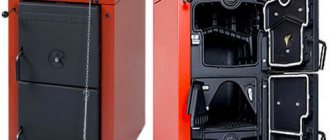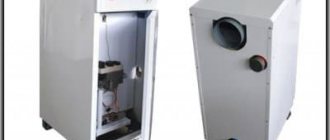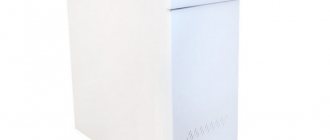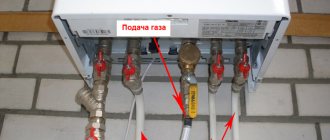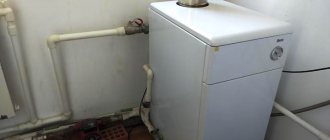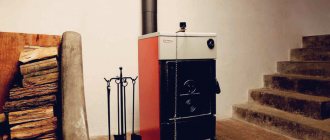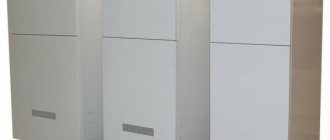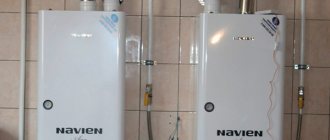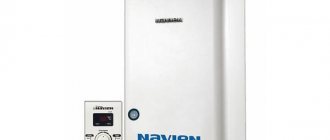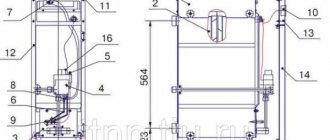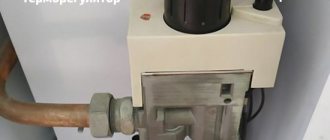- When using coal, one load of fuel is enough for 12 hours. However, if the frost is below -30C, then you have to approach such boilers much more often. One load of coal under such conditions burns for approximately 5-6 hours. This means you will have to get up early in the morning to renew the night fuel supply.
- When using firewood, or, as they say, one bookmark is enough at a temperature outside the window of -15C -20C for 3-5 hours. And in case of extreme frosts, you will have to add firewood every 2-3 hours.
The most popular sizes of Dakon DOR boilers are from DOR12 to DOR32, which make it possible to provide heat to private houses with an area of 100 to 300 sq.m.
Typically, the combustion chambers of DOR12 and DOR16 are the same - 26 liters. Just like the Dakon DOR20 and DOR24 boilers - 46 liters each. The difference in power of a pair of boilers is achieved by increasing the area of the boiler heat exchanger.
Differences between boilers
The line of models can satisfy the most demanding customer. In addition to differences in power, these boilers are distinguished by the principle of combustion:
- Classic scheme. This option involves heating the coolant in a jacket in direct contact with the combustion chamber. The design is quite simple and reliable, but has low efficiency.
- Gas generator models. In them, combustion occurs according to a double scheme. Pre-combustion causes the fuel to release pyrolysis gas, which subsequently enters the afterburner. Such Dakon solid fuel boilers are more expensive, but due to their high efficiency they allow you to save on fuel.
In addition to these varieties, the company produced long-burning models. However, they remained unclaimed on the Russian market due to their high cost.
Conclusion
If for some objective or subjective reasons you have firmly decided to use firewood or other solid fuel as the main energy source, then you will not find better boilers than those produced by the Czech company Dakon. There are better and more innovative models, but their cost is much higher. You can learn more about climate control equipment from European manufacturers from the video below.
Did you like the article? Subscribe to our Yandex.Zen channel
Cast iron and steel boilers
Dakon products are made of steel and cast iron. The different properties of these materials make it possible to make boilers that run on both wood and coal. There are also combined options.
Dakon steel heating boilers have a lower weight with equal power. They are resistant to pressure drops in the system. They do not require careful transportation, unlike their cast iron counterparts.
The most popular model is Dakon DOR. It has a built-in safety system against high pressure and overheating. The product is equipped with a three-section heat exchanger, which allows the boiler to operate at optimal temperature conditions. The draft regulator makes it possible to smoothly change the heating of the liquid, both manually and automatically. Fuel is loaded through a vertical hopper that expands upward. Heating equipment “Dakon Dor” is universal - it can burn any solid fuel: firewood, briquettes, coal.
Cast iron boilers are more expensive and are labeled Dakon FB. Compared to steel products, they are durable, not subject to corrosion and burnout. It is possible to change operating modes, as well as turn on additional blowing. This allows you to burn both wood and coal equally efficiently. The heating of the coolant is also controlled through an automatic draft regulator. The heat exchanger has several sections for efficient heat transfer.
Cast iron solid fuel boiler Dakon FB D
Out of production
Main advantages:
Cast iron boilers DAKON FB D
designed to burn wood (primary fuel) or coal (backup fuel).
DAKON FB D
boilers are manufactured and assembled from cast iron sections of the highest quality, equipped with thermal insulation made of non-asbestos materials, a thermomanometer and a direct-acting draft regulator. The fuel in the boiler is burned using the combustion method with automatic regulation of the primary air supply and manual regulation of the secondary air supply.
Advantages of DAKON FB D boilers:
- long service life even in low-temperature operating conditions;
- Possibility of use in both natural and forced circulation systems.
- possibility of conversion for operation with gas or liquid fuel burners.
TECHNICAL PARAMETERS AND PRICES of FB D boilers
| Boiler name according to the manufacturer's catalog | FB 20D | FB 26D | FB 32D | FB 36D | FB 42D |
| Rated power, kW | 17 | 22 | 28 | 32 | 38 |
| Length, mm | 840 | 940 | 1040 | 1140 | 1240 |
| Width, mm | 500 | 500 | 500 | 500 | 500 |
| Height, mm | 1035 | 1035 | 1035 | 1035 | 1035 |
| Weight, kg | 210 | 245 | 280 | 315 | 350 |
| Boiler water volume | 27 | 31 | 35 | 39 | 43 |
| Fuel consumption, kg/h | 4,85 | 6,11 | 7,38 | 8,65 | 9,92 |
| Exhaust gas pipe diameter | 150 | 150 | 150 | 150 | 150 |
| Out of production | |||||
Pyrolysis combustion
Equipment marked Dakon KP PYRO refers to pyrolysis boilers, the high cost of which is compensated by economical operation. Combustion takes place in two chambers. In the first, fuel is preheated in the chemical underburning mode. Then the released pyrolysis gas enters the afterburning chamber. There it is additionally mixed with air, and it ignites.
It should be noted that the air supply is forced, so the boiler requires electricity to operate. This scheme allows you to increase the combustion process in time to 5-10 hours. Which affects their cost. The price of long-burning solid fuel boilers varies from 95 thousand rubles.
Gas generating equipment uses any type of solid fuel, but the most efficient operation is achieved when burning wood. In order for the efficiency to correspond to that declared by the manufacturer, the wood must have a moisture content of no more than 20%.
Coal and wood boiler Dakon DOR reviews from owners
There are the following reviews on Dakon boilers from owners and users:
Anton Kamolov, Syktyvkar: The boiler is normal, only in cold weather you have to approach it often. Coal burns well into dust. If only this boiler had a bigger bunker for fuel - it wouldn’t have a price. I use a Dakon DOR20 boiler and heat a house made of timber with a total area of 185 square meters. I burn coal. Only the quality of coal is different from time to time, different every season. But the boiler copes, the coal does not bake. I'm happy.
There is also a review of the Dakon DOR boiler based on the experience of using this boiler with wood:
Mikhail Shvatin, Kemerovo: I heat the “twenty” with wood, fortunately now you can easily get good firewood for 800 rubles per cubic meter. Everything would be fine, but the frankly small size of the firebox is annoying. We have to make almost toothpicks out of firewood. Perhaps the Czechs heat this boiler with briquettes, but briquettes are not in use here. But in use are normal logs, which are never smaller than half a meter. So they have to be cut in half to heat a 20 kW boiler.
Next, we will consider the main pros and cons of these Czech boilers.
Safety regulations
Dakon solid fuel boilers already have a built-in security system. In the event of a sharp increase in pressure, it will preserve the integrity of the water jacket. However, you should not neglect the standard installation of the heating system safety group. Installing the included thermometer will allow you to accurately monitor the temperature of the liquid and prevent it from overheating.
To reduce scale and foreign inclusions in the coolant, mechanical filters are used, as well as a liquid that reduces the formation of calcium deposits. This makes it possible to maintain heat transfer efficiency.
About the manufacturer
The company was founded in the Czech Republic in 1949, shortly after the end of World War II. It was not an enterprise founded from scratch: several enterprises of various directions united under the name Dakon. The group focused entirely on the production of heating equipment around 1965.
Already in 1970, Dakon became the largest manufacturer of solid fuel, liquid fuel and gas boilers in the Czech Republic. Production volume reached 30 thousand units per year. The products at that time were exclusively household equipment with a power of no more than 30 kilowatts.
By 1990, the total number of heating equipment units produced reached 620 thousand. Considering the scale of a small country, this is a huge number.
Reference: the current population of the country is only 10 million people, most of whom live in apartment buildings. Obviously, exports accounted for the majority of sales. However, there is no exact data about this on the company’s website.
By 1994, the country switched to a capitalist economic model. The enterprise is privatized and sold to private individuals. However, the company did not suffer the sad fate of many enterprises of the Soviet Union: the assets and material and technical base were completely preserved.
What followed was a series of continuous successes.
- 1995 - Unical joins Dakon and receives 10% of assets.
- 1996 - production of pyrolysis (gas generator) boilers using wood began.
- 1998 - the company included cast iron gas boilers with an extended service life in its product range.
- 2000 - extremely economical condensing gas boilers began to be produced.
- Finally, in 2003, the main share of the assets was bought by the Buderus company, which, in turn, is part of the giant Bosch concern. The brand has retained its name.
Dakon became part of one of the world's largest corporations with annual sales of 52.5 billion euros (data for 2012).
Currently, Robert BOSCH GmbH produces heating equipment under three brands with different market positioning.
- Buderus boilers are aimed at installation organizations offering comprehensive solutions.
- Devices under the names Dakon and Junkers are supplied primarily for retail sale to dealerships.
All brands are extremely highly rated on the heating equipment market - in fact, like all German products. Alas, for the end consumer this means not only pleasant things: the retail price of the device will include a large markup for the manufacturer’s name.
By what criteria to choose
When purchasing a Dakon solid fuel boiler, the question always arises: which model to choose? To do this, you need to consider several criteria:
- Power. For heating a well-insulated house up to 100 square meters. m, an option with a power of up to 10-15 kW is suitable.
- Autonomy or energy dependence. If there are power outages in the area where the boiler room is being installed, then it is better to look towards options that do not require forced air supply for operation. Accordingly, these are the Dakon DOR and Dakon FB models.
- Economy. Boilers with high efficiency and long operating time on one charge are Dakon KP PYRO models.
- Life time. The manufacturer assures that the average lifespan of steel boilers is 10-12 years, and cast iron boilers - 25, with proper care and compliance with operating rules.
- Financial opportunities. The higher the efficiency of the equipment, the higher its cost. Therefore, pyrolysis boilers are the most expensive.
Also, when choosing, you should pay attention to reviews from real users. Weaknesses and strengths are always revealed in the process, such as ease of cleaning, ease of loading, stability in operation.
History of the development of the brand
The Dakon company was registered in 1949 in the Czech Republic. The company was not founded out of nowhere, but was formed as a result of the merger of several manufacturing companies engaged in the production of various climate control equipment. The concern began to specialize in the production of heating boilers only in 1965.
The company has existed for more than half a century
However, after 5 years, thanks to skillful leadership, Dakon occupies a leading position in the domestic market.
The range of boilers produced by the company includes the following models:
- solid fuel boilers Dakon (classic and pyrolysis);
- heaters running on liquid fuel;
- gas climate equipment.
At that time, production volumes did not exceed 30 thousand units per year, and the power was 30 kW, that is, the heaters could be used exclusively for heating small and medium-sized residential buildings.
The next 20 years were marked by explosive growth for the company. By 1990, the number of boilers produced exceeded half a million; the range included models used for heating industrial complexes and commercial buildings.
Note! The population of a small country - the Czech Republic - is concentrated mainly in cities. Therefore, the domestic market could not absorb such a quantity of products, and therefore most of it was initially intended for sale abroad.
The photo shows the production center of the enterprise
In 1994, the country switched to a market economy. It was then that the enterprise was sold into private hands, but this did not in any way affect the quality of the boilers produced or the volumes.
This is evidenced by the company's continued success on the Czech and international markets:
- in 1995, the company acquired the assets of the Italian manufacturer of climate control equipment - Unical;
- in 1996, the company's production centers produced the first solid fuel boilers Dakon, in which a pyrolysis fuel combustion scheme was implemented;
- in 1998, the company mastered the production of wood-burning heaters with cast iron fireboxes, which have increased strength and a long service life;
- in 2000, the company launched condensing boilers on the market, characterized by increased efficiency;
- in 2003, Dakon became part of the international concern Baderus, which is part of the world-famous German holding Bosch.
However, given the worldwide popularity of the Dakon brand, the management of the German corporation decided to preserve the brand. And now the company’s production centers produce Dakon solid fuel heating boilers, which continue to delight consumers around the world.
One of the stages of assembling Dakon boilers
“Dakon” is a technique proven by time and... Russia
The widest range. This is not just a phrase that can be read in any manufacturer’s advertising brochure. If others use it only for the sake of a catchphrase, to attract attention, then in our case this is the pure truth. There is no other manufacturer represented on the Russian market that would offer such a wide range of heating boilers. Among them: 1. Gas: a) wall-mounted: ❏ with natural removal of combustion products; ❏ with forced removal of combustion products; ❏ with a flow-through DHW heat exchanger; ❏ with built-in boiler. b) floor-mounted: ❏ with a cast iron heat exchanger; ❏ with a steel heat exchanger; ❏ dependent on the supply of electricity; ❏ autonomous from electricity. 2. With replaceable burners for liquid fuel and gas: ❏ for heating relatively small objects (up to 1000 m2 - NM); ❏ for heating enterprises, residential complexes, hotels, sanatoriums, etc. (Prexal). 3. Electrical: ❏ PTE; ❏ PTE L. 4. Solid fuel: ❏ traditional; ❏ gas generators. 5. Universal (solid, liquid or gaseous fuel). The breadth of the product range is an undeniable advantage for any company working with DAKON products. After all, this is, firstly, the convenience associated with purchasing a wide variety of boilers in one place, and secondly, the best commercial conditions, because you don’t have to “spread” your budget when purchasing equipment from different suppliers, but you can purchase a variety of types of boilers from one manufacturer, and as a result receive the largest discounts, depending on the volume of purchase. It is clear that it is impossible to talk about so many models in one article, so we will focus on some of them that distinguish DAKON from a huge number of competitors. Gas boilers DAKON Plux Z As you know, the vast majority of imported gas boilers are not able to operate without electricity. On the other hand, in Russia there are often cases of problems with electricity - in some places it is supplied intermittently, and in some places it is completely absent. What are the ways out of this situation? The first is to simplify the boiler control system as much as possible and, due to the almost complete absence of automation, achieve independence from electricity (this applies, in particular, to domestic boilers). In this case, the boiler can only maintain the specified temperature of the coolant (water or antifreeze) and will not be guided by the air temperature in your room. Czech engineers have found a second, more progressive method - using a built-in generator, which from heat generates electricity necessary for the operation of the boiler automation. DAKON Plux Z boilers can be used with remote room thermostats, which will control the boiler and maintain the room temperature you set. Electric boilers The Czech company DAKON produces a wide range of electric boilers with a power from 4 to 60 kW (30 models). The standard equipment of all DAKON electric boilers includes a multi-stage German WILO pump. Each boiler is equipped with a water pressure sensor, some modifications have a built-in expansion tank, safety valve and filter. Boilers with a power of up to 12 kW are available in two versions - single-phase and three-phase. The range includes models of both the budget class (PTE) and the most modern and progressive (PTE L), equipped with quiet-running contactors, an improved operating mode signaling system, an expansion tank and a safety valve. Solid fuel boilers DAKON are the obvious leader among foreign manufacturers selling solid fuel boilers in Russia. Let's start with traditional models. DAKON DOR. The indisputable advantage of this series is high quality at a very affordable price. It is no coincidence that these boilers are already successfully heating thousands of houses throughout Russia. DAKON DOR boilers are designed for burning almost all types of solid fuel: brown and hard coal, briquettes, coke, wood and wood waste. Combustion efficiency is ensured by the use of a new grate system and a new design of the combustion chamber using primary and secondary air together and with the ability to adjust the supply of additional air. DAKON DOR series boilers can automatically maintain the specified outlet water temperature. This is done as follows. The boiler is equipped with a sensor that monitors the temperature of the water (coolant). It is mechanically connected to the combustion air supply damper. If the temperature of the coolant at the outlet becomes higher than the set one, the damper automatically closes and the combustion process slows down. When the temperature drops, the damper automatically opens slightly. Please note that this device does not require connection to an electrical network. For burning wood and wood waste, DAKON designers have developed a modification of DAKON DOR D. The design of DAKON DOR D boilers is in many ways similar to that of the DOR series. They are distinguished by the addition of heat-resistant segments and fireclay boards to the combustion chamber, which act as catalysts and improve the combustion of wood. The advantage of these boilers is the ability to burn wood with a moisture content of up to 35% (these boilers can also be used to burn coal, coke, and briquettes). Six models of DAKON DOR boilers are produced with a power from 12 to 32 kW and two DAKON DOR D with a power of 32 and 45 kW. The volume of the loading chamber for solid fuel boilers DAKON DOR varies from 26 l (models DOR 12 and DOR 16) to 115 l (model DOR 45D). The efficiency of DAKON DOR boilers when using brown coal as fuel reaches 84%. Speaking about DAKON solid fuel boilers, we cannot fail to mention the models with pyrolysis combustion of wood - GASOGEN and KP PYRO. Their main advantages are significantly higher efficiency (up to 85%) and ease of power regulation. The main difference between boilers with pyrolysis combustion is the combustion of not only the wood itself, but also the wood gas released from it under the influence of high temperature. Wood gas is formed in the fuel hopper, then passes through a special nozzle and burns with a very clean flame of yellow or even almost white color. During such combustion, no soot is formed and a minimal amount of ash remains. The disadvantages of pyrolysis boilers include the need for power supply and a higher price compared to traditional solid fuel boilers. Four modifications of boilers are produced: KP PYRO with a power from 18 to 38 kW and GASOGEN with a power of 24 and 60 kW. Universal boilers DAKON FB boilers are designed for burning coal, anthracite and coke. The DAKON FB D modification is more suitable for burning firewood, wood briquettes and wood waste. A very important feature of the FB and FB D boilers is the ability to connect blown burners to them to operate on gas or liquid fuel. DAKON FB and FB D boilers are assembled from cast iron sections of the highest quality. Another advantage of these boilers is their long service life, even in low-temperature operation. They can be used in heating systems with both natural and forced circulation, in open systems and in systems with a pressurized expansion tank. The DAKON FB and FB D boiler series include models with a capacity of 20; 26; 32; 36; 42 kW. The DAKON FB boiler body is made of high-quality cast iron. An integral part of the housing are fixed grates cooled by water. DAKON FB boilers are also equipped with a power regulator, which is connected by a chain to the boiler damper. Obviously, choosing a boiler that is most suitable both in terms of price and functionality is not an easy matter, and the final decision should be made only after consultation with professionals. will help you quickly and competently select the optimal type of boiler, provide comprehensive support in the configuration of facilities, and also provide advisory and warranty support for products. HISTORY 1949 - DAKON began its existence. At that time, it consisted of several factories producing various equipment. Since 1965, the company has focused its attention directly on the development and production of heating boilers with a power of up to 30 kW. Already in 1970, DAKON became the largest manufacturer of heating boilers operating on gas, liquid and solid fuels with an annual production volume of 20 to 30 thousand units. In addition to boilers, the production of all-metal structures for various construction purposes was launched. The company united five factories, which employed approximately 600 employees. During the period until 1990, DAKON produced 620 thousand heating boilers. 1990 - From 1991 to 1994, the state-owned company DAKON gradually became the property of private companies. Thus, in 1994, approximately 73% of the company's property was acquired by private individuals, i.e. its largest and most important part. They formed the joint stock limited liability company DAKON. In 1995, a foreign partner, UNICAL, joined the company and bought a 10% share of the company's ownership. Boiler production increased from 13 thousand units. in 1994 to 500 thousand in 2001. The model range has also expanded significantly. If in 1994 only 13 standard sizes of boilers with a power from 7 to 32 kW were produced, now the company’s assortment includes more than 100 models with a power from 4 to 3500 kW, which also operate on any type of fuel. 2003 - in November 2003, the German company BUDERUS acquired the majority stake in DAKON and the company joined the largest European group of heating equipment manufacturing companies. The complete privatization of DAKON took place in July 2003, when BUDERUS merged with BOSCH. Currently in the Czech Republic the BOSCH group of companies is represented by the brands DAKON, BUDERUS, JUNKERS. The acquisition of DAKON enabled the BOSСH group of companies to become a leader among manufacturers of heating equipment in the Czech Republic, especially in wall-mounted boilers. Joining the BUDERUS group of companies is an important step for the further successful development of the company in the increasingly concentrated European market.
Main advantages
Dakon electric heating boilers perform well in operation. They are equipped with high-precision automation, which allows you to make the most user-friendly settings and maintain the operating mode at the set level without additional control from the owner. All actions performed, current temperature conditions and other useful information will be displayed on the display.
To protect the device from sudden voltage surges, it is worth installing a special stabilizer in the house. The automation has its own fuses that will burn out so that expensive equipment does not get damaged. But it will also be expensive to constantly replace them, and the stabilizer will come in handy in any case, since not a single Russian city has electrical networks where the supplied voltage has never exceeded the established norm.
